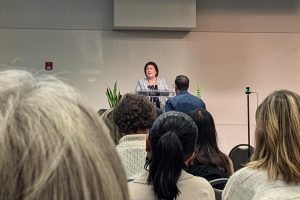Developing vision of future through historical lens
Hindsight officers argue how history alters perceptions of modern problems
January 23, 2020
Sophomore Cambria Babbitt and senior Anna Rosko joke and laugh about how 2020 brings perfect vision and an opportunity to look back on both the past and the present.
Babbitt is a sophomore triple-majoring in history, political science and honors liberal arts studies, and Rosko is a senior studying classics and history with a museum studies concentration. Both got involved in Hindsight club when they started at Seattle Pacific University.
Hindsight is a club that seeks to explore history and, in the process, build an understanding of events from the past and what people today can learn from them.
“The meaning behind calling the history club ‘Hindsight’ does sort of speak to the idea of being able to look at the past and better understand our present through the past — and letting those two things feed into one another and help us to become better citizens of our world,” Rosko said.
Hindsight’s mission, to observe the past and build a better future, is something Babbitt and Rosko resonate with both in their fascination with history and how it relates to their future goals.
Babbitt plans to pursue a career in political activism. She believes studying history will be helpful because politics and history hope to achieve the same purpose: uplifting the commonly unheard voices of people whether that be in the past or the present.
“A very important part of political advocacy is empowering others to use their voice and to share their stories and background for change, which is basically what history is: people using their voice and creating change,” Babbitt said.
Rosko hopes to one day work in a museum in order to help people engage with those stories.
“My goal with working in museums is to help others understand the past, but more importantly develop empathy for people of the past. And that does, again, inform how we move forward with our future,” Rosko said.
Due to Rosko and Babbitt’s interests in history, they got involved in spaces that allow for reflection on the past.
One of these spaces was the play “Necessary Sacrifices,” which they saw as a club when it was playing at Taproot Theatre located in Northwest Seattle.
The play tells the story of what it would be like if Abraham Lincoln and Frederick Douglas were able to have a conversation. It constructs this dialogue by using various speeches from each of them. It weaves together a story that, while fictional, deals with issues of the time such as racial and gender inequalities.
As part of their reflections on past injustices, they were also able to witness how issues from long ago still applied to today.
“Putting it in that dialogue, first of all, showed how you can have constructive dialogue today and then also put it into perspective in that these issues that they brought up were still relevant today and allowed us to have that discussion,” Rosko said.
According to Babbitt, one of these discussions surrounds the topic of the Civil Rights Act of 1964, during an era when civil rights were expanded to include more Americans. Even today, Virginia just ratified that amendment on January 15 of this year and many states in the South have yet to ratify the amendment.
This slow progress resonates with Rosko, who acknowledged that, at the end of the day, history does not always lead to positive changes.
“Progress isn’t always forward moving, it isn’t always linear. There are some steps that can be taken backwards and that is something else that I think the discipline of history speaks to,” Rosko said.
Rosko also had the opportunity to go on SPU’s four-week Holocaust study abroad that provided her with a deeper understanding of the tribulations faced by Jewish people during the Nazi regime’s reign.
During the trip, Rosko was able to develop a better understanding of the atrocities that occurred by visiting the concentration camp Auschwitz-Birkenau in Poland, visiting the old Jewish quarter in Prague and meeting a Holocaust survivor.
“We got to sort of walk in the footsteps of the Jewish people who had been unjustly persecuted, mistreated, [and] taken away from their homes,” Rosko said.
One of the most important aspects of the trip was how it shaped her understanding of the importance of history and the messages such a catastrophic event leaves for humanity today.
“Being in these sights really meant a lot for how I understood the history. There is a degree of magnitude to its significance, especially seeing how, politically, things have shifted over the last few years. And that message of ‘never again’ really does hit home when you hear what people are saying,” Rosko said.
While being fascinated by different eras of history, Babbitt and Rosko both understand the vital importance of historical events, such as the Holocaust or slavery in the United States, can play in influencing how people handle contemporary issues.


























































































